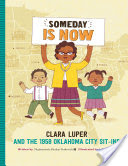
Our collection of picture books featuring Black and Indigenous people and People of Color (BIPOC) is available to the public. *Inclusion of a title in the collection DOES NOT EQUAL a recommendation.* Click here for more on book evaluation.
Find titles using a keyword search below (e.g. adoption, birthday, holidays, etc.), or by selecting one or a combination of filters on the lefthand sidebar below.
First time here? Start here!
9 matching books
Show Filters
If You Were a Kid During the Civil Rights Movement
"Follow along with two girls as they find themselves in the middle of a civil rights demonstration, and find out how the fight for equality changed the country forever.Joyce Jenkins has recently moved to a new town with her family, and she will soon be attending a segregated school for the first time. Meanwhile, Connie Underwood is trying to figure out what her twin brothers are planning in secret. Readers (Ages 7-9) will follow along with the two girls as they find themselves in the middle of a civil rights demonstration, and find out how the fight for equality changed the country forever." -- publisher

We are still here!
"Too often, Native American history is treated as a finished chapter instead of relevant and ongoing. This companion book to the award-winning We Are Grateful: Otsaliheliga offers readers everything they never learned in school about Native American people’s past, present, and future. Precise, lyrical writing presents topics including: forced assimilation (such as boarding schools), land allotment and Native tribal reorganization, termination (the US government not recognizing tribes as nations), Native urban relocation (from reservations), self-determination (tribal self-empowerment), Native civil rights, the Indian Child Welfare Act (ICWA), religious freedom, economic development (including casino development), Native language revival efforts, cultural persistence, and nationhood." -- publisher

Unspeakable
"A remarkable look at a significant moment in our nation's past, shedding light on racial violence and offering hope for a better future. Celebrated author Carole Boston Weatherford and illustrator Floyd Cooper provide a powerful look at the Tulsa Race Massacre, one of the worst incidents of racial violence in our nation's history. The book traces the history of African Americans in Tulsa's Greenwood district and chronicles the devastation that occurred in 1921 when a white mob attacked the Black community. News of what happened was largely suppressed, and no official investigation occurred for seventy-five years. This picture book sensitively introduces young readers to this tragedy and concludes with a call for a better future." -- publisher

Pappy’s handkerchief
In 1889, young Moses and his family sell everything they own and leave their Baltimore, Maryland, home to join many other settlers--black and white--in a race to claim land in the newly-opened territory of Oklahoma.

Someday is now
Presents the life of Clara Luper, an African-American teacher and local civil rights leader who taught her students about equality and led them in lunch counter sit-in demonstrations in Oklahoma City in 1958.

Fly high!
Discusses the life of the determined African American woman who went all the way to France in order to earn her pilot's license in 1921

She sang promise: The Story of Betty Mae Jumper, Seminole Tribal Leader
Betty Mae Tiger Jumper was born in 1923, the daughter of a Seminole woman and a white man. She grew up in the Everglades under dark clouds of distrust among her tribe who could not accept her at first. As a child of a mixed marriage, she walked the line as a constant outsider. Growing up poor and isolated, she only discovered the joys of reading and writing at age 14. An iron will and sheer determination led her to success, and she returned to her people as a qualified nurse. When her husband was too sick to go to his alligator wrestling tourist job, gutsy Betty Mae climbed right into the alligator pit! Storyteller, journalist, and community activist, Betty Mae Jumper was a voice for her people, ultimately becoming the first female elected Seminole tribal leader.--publisher

Saltypie
Stories of the author's Choctaw Indian family, centering particularly on his blind grandmother.

The Hallelujah Flight
In 1932, James Banning, along with his co-pilot Thomas Allen, make history by becoming the first African Americans to fly across the United States, relying on the generosity of people they meet in the towns along the way who help keep their "flying jalopy" going
